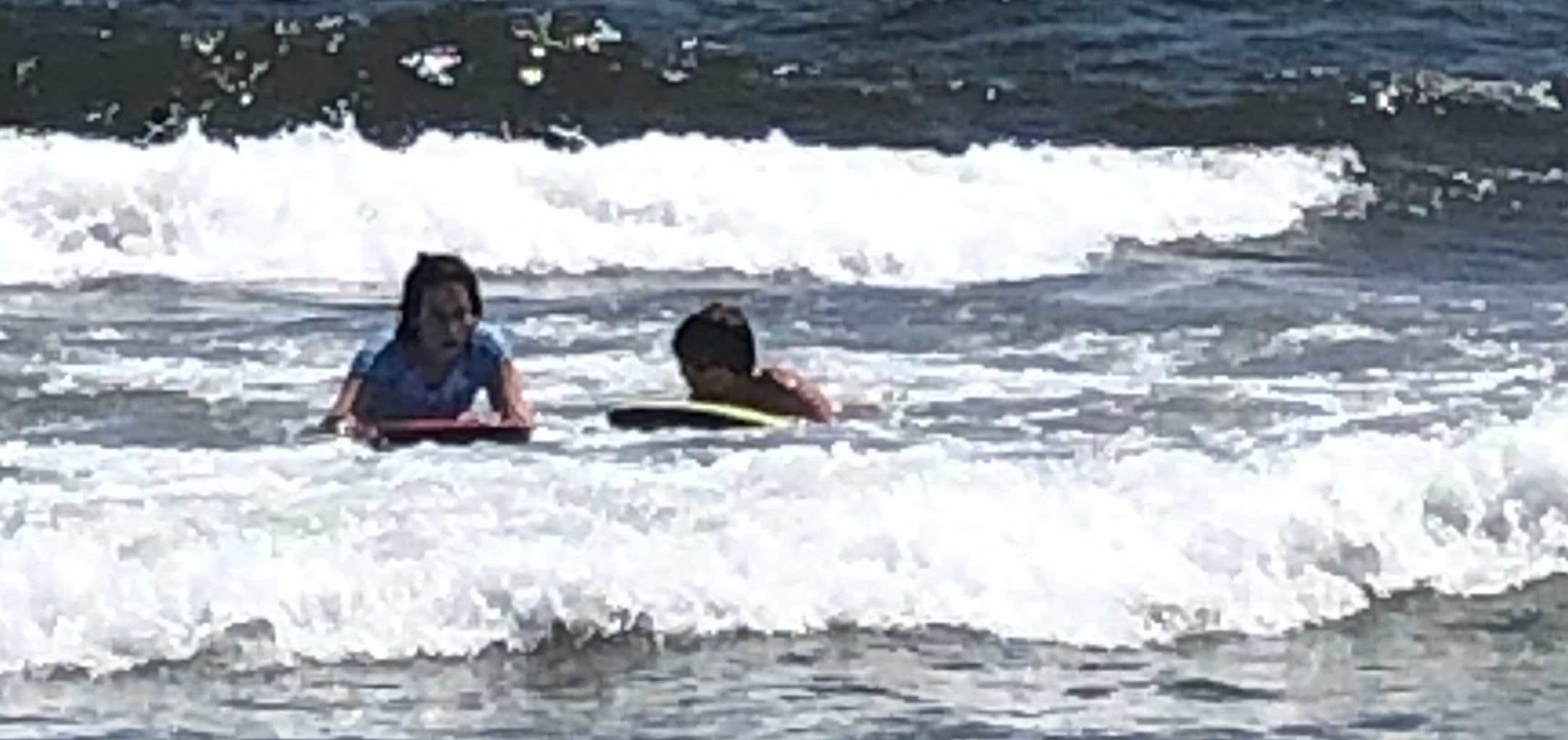When I was seven years old, I nearly drowned off the coast of Puerto Rico. I can still remember the experience as if it were yesterday. Playing in the water with my siblings, we drifted further and further away from the beach until my mom was desperately flailing her arms, trying to get us to swim back in. It was too late and at that point, the undertow was too strong. I was a strong swimmer but couldn’t fight against it. I can recall the weakness in my arms as I fought to make it to shore, swimming against the overpowering tide, opening my eyes in the saltwater at one point and realizing I wasn’t getting anywhere. One lifeguard swam out to save me and he got caught in the undertow, so another swam out to help us both and he got stuck. Ultimately it took six lifeguards to get me and the others safely back to shore. I loathe ocean swimming and have done ever since that day. It brings me no joy, only fear.
In contrast, my children love swimming in the ocean. They relish diving under the crashing water for hours or boogie-boarding on the crests of wave after wave until they can barely see straight. When they were younger, I swallowed my fear and went in the ocean with them, gripping their hands too tightly as we jumped over and dove under waves. Ostensibly I was sharing their joy, but mostly I wanted to be near them in case they nearly drowned.
Now that my children are bigger, I don’t need to get into the ocean with them. They always invite me to join them and I always decline, choosing instead to stand ankle-deep in the water near the lifeguard stand (fully aware there are highly trained lifeguards also watching my children.) I feel both incredibly relieved that I don’t have to get into the ocean and completely terrified watching my kids in the water. Their different sized bodies, little and big, getting run over by waves. That brief yet endless moment before their smiling faces emerge from the water, mouths sputtering salt water, wet hair plastered across their foreheads. They communicate with me with our agreed-upon hand gestures: “too far out,” “come closer,” “that’s good,” “I’m ok,” because it’s impossible to hear each other over the sound of the surf.
This weekend, after watching them for a few hours, my back starts to hurt from standing on the sand for so long and a part of me rues the fact that I can’t watch them and be productive at the same time. Isn’t there something else I can be doing while keeping them safe — exercising or answering emails or doing my FreshDirect order? But instead, I give myself over to the reality that all I can do in that moment is stand watch over my children to give myself the illusion that I am keeping them safe.
In this limbo of unproductivity, I begin to think about how much watching them swim in the ocean reminds me of the experience of parenting as a whole. There is the obvious realization that like watching them on the ocean, often our kids want to do things that we ourselves do not enjoy or that we find scary to let them do. But more than that, I think of the larger process of letting go of control as our children get older. We give them the skills to become independent so that they don’t rely on us and can do things on their own. I taught my children to swim. I swam in the ocean with them to model good judgment. I set up parameters about what safe ocean swimming looks like. I gave them a way to communicate with me while they were swimming. I watched over them from afar while they went out on their own to swim. And I keep watching them, not necessarily because they need me to, but because it makes me feel better to do so.
Beyond this slightly clichéd metaphor, courtesy of my aching back and my lack of distractions, I realize that watching my kids in the water together is also about watching my kids in the water TOGETHER. I watch my biggest kid pick up my littlest kid after a particularly ferocious wave knocks him flat. I watch my two youngest kids stand shoulder to shoulder while boogie boarding, so close to each other I worry they’re going to accidentally whack each other with their boards. I watch my youngest son realize he’s lost sight of his sister, scanning the water looking for her, smiling and shouting when he finally spots her. I am not in the water with them, but they are in the water with each other, looking after each other.
I am so grateful for this realization that comes from standing on the sand for hours, seeing my kids get battered by the waves. I still loathe swimming in the ocean, but I actually do love looking at the ocean. It reminds me of my powerlessness and my irrelevance in the larger scheme of the universe. And now I particularly love looking at my children in the ocean, even though it thoroughly terrifies me. Watching them provides me with the thrill of marking my kids’ growth, their self-sufficiency and dare I say, a job occasionally well done by me? Even more so, I love looking at my children in the ocean together because it allows me to witness as a spectator not an intervenor, their support for each. I hope that what is true in the water is true in their lives, that when one gets knocked down the other picks him up, that when they are up against a challenge they stand shoulder to shoulder and that when one is lost she has someone keeping an eye out to make sure she is safe. While swimming in the ocean brings me fear, this hope brings me joy.







